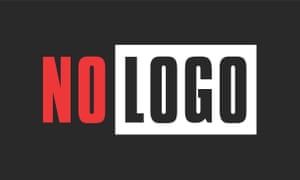Some political books capture the zeitgeist with such precision that they seem to blur the lines between the page and the real world and become part of the urgent, rapidly unfolding changes they are describing. On 30 November 1999, mere days before the publication of Naomi Klein’s debut, No Logo, the epochal “Battle of Seattle” began. Tens of thousands turned out to protest against the World Trade Organisation, and the global corporate interests it represented, and were met with tear gas, pepper spray, rubber bullets and stun grenades. Seattle’s mayor declared a state of emergency, and a massive “no protest zone”, as the violence continued, while the chief of police resigned.
Reading No Logo back then in my first year at university was hugely formative; the book, mixing eye-opening reportage with sharp-tongued analysis of consumer capitalism, was a bible for understanding the world my generation was growing up in and the motor behind a new kind of grassroots politics. The battle lines were clear, as ordinary citizens around the world stood in opposition to corporate greed, sweatshops, union-busting, “McJobs”, privatisation and environmental destruction: and the avatar for them all, the increasingly unavoidable logos of western “superbrands”.
While our minds were elsewhere, the superbrands ramped up their cannibalisation of every aspect of our cultural lives
No Logo was published on the cusp not just of a new millennium, but a new phase of globalisation, in which household names such as McDonald’s, Nike, Shell, Starbucks, Disney, Coca-Cola, Pepsi and Microsoft could trample over workers’ rights, local laws and civic opposition in pursuit of ever bigger profits, as western outsourcing crashed against the shores of the developing world, leaving behind human misery and environmental ruin as the tide rolled out.
The book charted the dramatic rise in the west of youth-oriented, cool-hungry consumer capitalism, in which companies sold an idealised lifestyle, not the physical product on the shelf. With the factories and production lines moved out of sight, and out of mind, the superbrands could focus their north American and European operations on ever more elaborate and intrusive marketing schemes and protecting their brand through censorship and legal action. In one infamous case, Disney sued a small-town creche for painting an unauthorised mural of their characters. Privatisation, Naomi Klein observed in No Logo, “slithers into every crevice of public life”.

Caustically funny and polemical in places, Klein’s book won plaudits for her dogged research and reportage, from the candid and stomach-turning declarations of the brand gurus and snake-oil sellers to first-hand reporting from the sweatshops in the developing world’s semi-lawless “export processing zones”.
It became a new truism, for those of us schooled in No Logo’s worldview, that corporations were becoming more powerful than governments. Where previous generations had focused on the oppressive strictures of militarism, racism, nuclear power or patriarchy, the superbrands now became synonymous with all that was wrong with the world. After the fall of the Berlin Wall, they roamed across the globe unhindered and their marketing-first mentality took over party politics too: New Labour, reflected a piece in ad-land bible Campaign marking the tenth anniversary of the 1997 general election, was “perhaps the most brand-savvy political project in British history”.
No Logo had a global impact far beyond anything Naomi Klein – only 29 at the time and unknown outside her native Canada – had expected. It became a bestseller in the UK (among numerous other countries) and was translated into more than 30 languages, with more than a million copies in print worldwide. The instant success propelled her to fame and Klein’s subsequent books The Shock Doctrine, No Is Not Enough and This Changes Everythingwere all bestsellers (her newest, On Fire, making the case for a green New Deal, arrives in September). No Logo inspired numerous musicians and artists: Radiohead were so swayed by the book that they toured Europe in a tent to avoid corporate-sponsored venues and considered naming their 2000 album No Logo, before finally alighting on Kid A. The book did so well, in fact, that Klein’s publisher tried to persuade her that they should copyright the title and logo; others, seemingly oblivious to the irony, even proposed a No Logo clothing line. Incredulous, Klein declined.
A backlash from the corporate world inevitably followed: most famously, the Economist published a cover feature riffing on Klein’s book jacket design, with the splash “Pro Logo: Why brands are good for you”. But the protests continued, as in Seattle usually organised around gatherings of the WTO, the World Bank, the IMF or the G8. In the press, these were often described as “anti-globalisation”, though the activists preferred “the global justice movement” – they weren’t against internationalism, they argued, they just wanted it done very differently.
“No Logo hit at this moment when a global movement was exploding and taking mainstream commentators entirely by surprise,” says Klein on the phone from the west coast of Canada. “It felt a bit like a dam breaking – every month, there was another massive demonstration, across the world, not just in the global north.” She had real trouble finding a US publisher for the book, she recalls. They would tell her how much they loved the manuscript, but that there would be no interest in it: “The perception among media and cultural gatekeepers in the late 90s was that young people were completely apolitical.”
What strikes me, rereading the book now, is not that Klein was wrong in her diagnosis, but that the changes she was documenting are so much worse than we could have ever predicted – from PepsiCo exploring the idea of broadcasting its logos into space to KFC buying festival DJ slots for Colonel Sanders. We have reached an audio-visual climax of total brand dominance, as if Piccadilly Circus or Times Square were simply laboratories for how our world would look in the 21st century.
So what happened to the focused anti-corporate anger Klein describes in the book? In an age of synergistic “brand personalities” with “strong voices”, integrated social media strategies, trend forecasters and micro-influencers, have we given in to the total branding of every aspect of our lives and culture?
Whether it’s Dove against body fascism or Gillette tackling toxic masculinity, our woke pounds are there for the taking
The critical moment…



